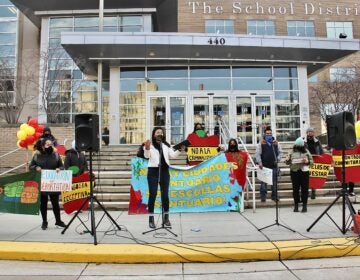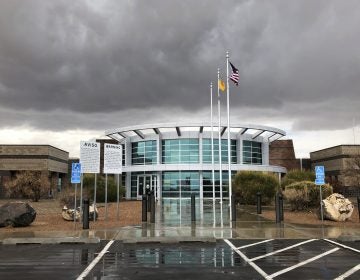Two towns, two approaches to immigration enforcement in Pa. Which is safer?
Experts can't say whether it's safer to keep ICE at arm's length with "sanctuary" policies or to work closely with federal immigration officers.
Listen 3:54
U.S. Attorney General Jeff Sessions gestures during a speech on Security and Immigration priorities before a group of law enforcement officials in Norfolk, Virginia last month. (AP Photo/Steve Helber)
U.S. Attorney General Jeff Sessions and other members of the Trump administration have repeatedly warned that policies in “sanctuary cities” — where police limit their cooperation with federal immigration enforcement — lead to more crime.
Leaders of these municipalities in Pennsylvania argue just as passionately that not working with U.S. Immigration and Customs Enforcement enhances public safety.
So which one is it?
Experts say the answer is murky.
A tale of two townships
Fred Harran, Bensalem Township’s public safety director, does not like sanctuary cities.
Addressing the audience at a Bensalem Township Council meeting earlier this year, he made the case for his police department going out of its way to work with ICE by telling the story of Wanda DeJesus and Edwin Ramirez Marte.
“Two cities, one right next to us, and one an hour and 15 minutes away — you can figure out what city that is — has a brother and sister [in custody] over the course of some time for dealing heroin and cocaine,” he said.
After venturing into the Lower Bucks County township, Harran said, the brother-sister duo are now behind bars for dealing heroin following their brushes with the law in Philadelphia and New York, both sanctuary cities. (Ramirez Marte appeared in the Bucks County criminal court docket for an arrest in 2017; no one under the name Wanda DeJesus did.) Both will be deported after serving their sentences because they have not been living in the U.S. legally, Harran said.
The way Harran sees it, it’s not about how many people like De Jesus and Ramirez Marte there might be. It’s about trying to have one fewer victim tomorrow.
“Since 2009, 4 percent of people we arrested were in the country illegally and were turned over to ICE,” he said. “If you were one of the 4 percent on the victim’s side, wouldn’t you have wanted us to take measures?”
That’s why, Bensalem police will alert ICE any time they arrest someone they find to be in the country illegally. The township has also requested training for some of its officers to enforce immigration laws usually left to the federal government.
Police chiefs in departments that don’t want to work as closely with ICE say they’re also motivated by public safety.
“If we wanted to, we could be forceful in taking people off the street because there are a lot of people here illegally,” said Michael Chitwood, police superintendent in Upper Darby, Delaware County. “But it’s not a part of what we do.”
Chitwood has a reputation for being tough on crime, most recently advocating that teachers be allowed to carry guns in schools. He’s even been the subject of a biography called “Tough Cop.”
Upper Darby also resembles Bensalem in several ways, even as they differ on their approaches to immigration enforcement. Both border Philadelphia, the largest sanctuary city in our region. Both are large suburban municipalities with tens of thousands of residents. And both have a large international community that includes undocumented immigrants.
In his community, Chitwood said, people in the country illegally tend to be the victims, not the perpetrators, of crime.
“Anytime we come across them is usually they’re a victim, walking home after a long week. They get paid cash, and here comes three or four bad guys. Stick ’em up, rob ’em, beat ’em up,” he said.
He and other officials in cities that don’t want to be associated with federal immigration enforcement say they need the cooperation of undocumented immigrants to help solve crimes and make their homes safer.
“In the Spanish-speaking group, most of the victimized individuals don’t want to come forward, because they’re here illegally, and they don’t want to be locked up,” said Chitwood.
In Bensalem, Harran said the police only refer people accused of crimes to ICE, not victims or witnesses. The idea is that the collaboration won’t inhibit cooperation. But members of the Bucks County NAACP, Buxmont Inclusive and Progressive, and immigrants rights groups have spoken out against Bensalem’s practices, and a proposal to formally partner with ICE.
What approach is better?
Evidence holds that immigrant communities commit crimes at a lower rate than native-born Americans, according to Temple University criminal justice professor Jerry Ratcliffe.
However, when it comes to whether it’s safer to keep ICE at arm’s length with “sanctuary” policies or to work closely with federal immigration officers, he said, “We have no idea.”
Police departments don’t make a habit of studying those relationships and keeping track of the results, and Ratcliffe said he’s not aware of any major studies on the topic in Pennsylvania or nationally.
“Most of the claims related to the idea that immigration is raising crime tends to come from one or two anecdotal cases, one or two high-profile cases that really send a signal that this is an issue to the community,” he said. “But if you look at those compared to the general level of crime, especially if you look somewhere like Philadelphia or around Pittsburgh, you see those numbers aren’t hugely significant.”
“I wouldn’t say that there is any way to measure [the public safety impact],” said Tom Gross, executive director of the Pennsylvania Chiefs of Police Association.
Gross and Ratcliffe both put forward an alternate theory on why police choose to partner with ICE — or not: local politics.
“Whoever is overseeing the chiefs might say, ‘We want to be more aggressive on illegal immigration,’ and some might say, ‘We want to be a sanctuary, we want to be less intrusive,’ ” said Gross.
Those elected officials — the mayors, town councils, and commissioners — may be basing their decisions on what the people who voted them into office want to hear, rather than hard data.
WHYY is your source for fact-based, in-depth journalism and information. As a nonprofit organization, we rely on financial support from readers like you. Please give today.




